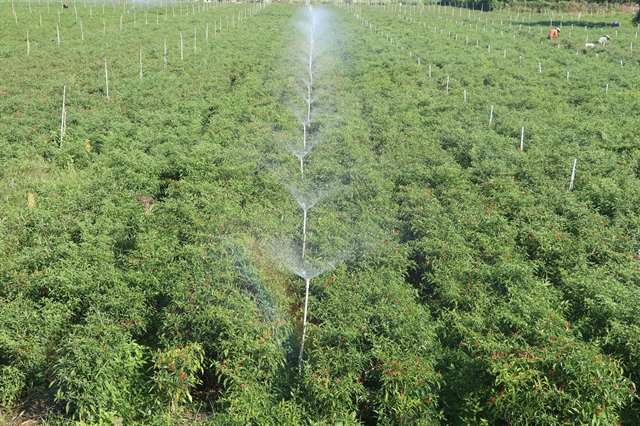 Society
Society

 |
| A red chili farm equipped with automatic irrigation in Đồng Tháp Province’s Tháp Mười District. — VNA/VNS Photo Nguyễn Văn Trí |
ĐỒNG THÁP — More and more farmers in Đồng Tháp Province use automatic irrigation to save water and improve efficiency.
They use automatic and semi-automatic-spraying and drip irrigation for fruits, vegetables, flowers, and ornamental plants.
In the Cửu Long (Mekong) Delta province, 58 per cent of fruit growing areas and 68 per cent of vegetable and flower growing areas are equipped with the devices.
Bùi Thanh Hưởng in Sa Đéc City’s Tân Quy Tây Commune invested VNĐ20 million (US$850) to instal an automatic spraying system in his 3,000sq.m flower farm, and said it could be used for many years and helps him save water and labour costs.
In Sa Đéc City, well known for its flowers and ornamental plants, more than 50 per cent of farmers use them.
They reduce the cost of labour to a 10th, according to the farmers.
Nguyễn Thành Dũng in Thanh Bình District’s Tân Mỹ Commune, has an automatic spraying system in his 5,000sq.m jackfruit orchard. He used to pay VNĐ300,000 ($13) a day to hire a worker to irrigate his orchard, but no longer has to.
The system irrigates trees evenly and reduces the use of water, he said.
Automatic irrigation helps reduce water by 30-40 per cent compared to traditional methods, according to farmers.
The need for fertilisers has also been reduced since they are not washed away unlike in traditional irrigation methods, they said.
The use of automatic irrigation helps farmers save VNĐ20 million ($850) per hectare per year.
Huỳnh Minh Tuấn, deputy chairman of the provincial People’s Committee, said the province has prioritised mechanisation of cropping and livestock breeding.
The use of advanced farming techniques and modern facilities helps reduce the impacts of the changing weather on agricultural production, cope with the shortage of labourers and reduce farmers’ work, he said.
The province targets having 90 per cent of vegetable and flower growing areas and all fruit growing areas equipped with automatic irrigation by 2030, he said.
Summer-autumn crop
Đồng Tháp hopes to provide enough water in the next few months of the dry season for more than 200,080ha of rice, vegetables, perennial trees, and aquaculture farms.
It will build or upgrade irrigation works and take other measures to secure water, according to the People’s Committee.
Authorities have instructed relevant agencies and localities to regularly update information about the weather and grow crops in compliance with schedules.
It has instructed farmers to restructure cultivation in areas that lack irrigation water by switching to drought-resistant crops.
This will be done on 6,306ha of rice fields this year.
Lê Quốc Điền, deputy director of the provincial Department of Agriculture and Rural Development, said this would help farmers improve their incomes, and so the department encourages rice farmers to switch.
“This [the switch] will help create specialised farming areas that grow crops in large volumes, build brands for agricultural produce and develop production codes for farming areas to help exports.” — VNS